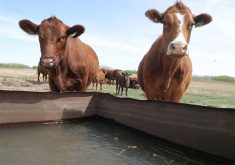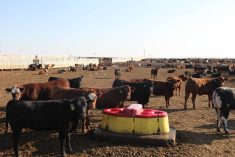A livestock producer’s best defence is a united offence against an animal rights movement that is not retreating, says the chair of the Farm Animal Council of Saskatchewan.
Shannon Meyers, interviewed following the group’s annual meeting in Saskatoon Dec. 13, said livestock producers, processors and industries need to consolidate their message.
“If you fragment yourself and each one of us tries to blurb a little message out here and there, that’s not the power of a unified voice.
“Doing that as a unified voice, I think will have more clout,” he said.
Read Also

Alberta eases water access for riparian restoration
Alberta government removes requirement for temporary diversion licence to water plants up to 100 cubic metres per day for smaller riparian restoration projects
Meyers said FACS is in a good position to counter positions taken by animal activists and advocate for those involved in food animal production.
He cited FACS’s ongoing educational work through regular correspondence and workshops and its involvement with Agriculture in the Classroom and displays at trade shows.
“We know it’s a powerful tool and we think we have a great message and something exciting to kids,” Meyers said, referring to an interactive display targeting youth that was launched at Canadian Western Agribition.
He citied statistics that show only three percent of Canadians now have a direct link to the farm.
“Every extra one that we touch is one more than we did yesterday.”
Meyers said animal rightists “are never going to go away no matter what you do. It’s not a battle to be won, but a lifelong engagement to be pursued.”
Gazing into the future and preparing for the animal rights movement’s next campaign are important strategies, said Dan Murphy, author of The Meat of the Matter.
“Talk now about what’s happening in four years so you can respond and be prepared,” he said.
Murphy told producers to start by promoting themselves.
“Share in a way that shows you care,” he said. ” Collectively, if we all do it, this is how the landscape will change.”
He suggested writing letters to the editor, giving interviews to media and making speeches in communities to add the producers’ voices to the animal welfare debate.
“You have a passion about your business; they have one, too,” he said. “They’re like missionaries out to change things.”
Murphy said studies show the public considers farmers and government agriculture departments as credible sources of information.
Producer responses should target the animal rights activists’ messages with fact sheets and sound science that challenge their statements and highlight any hypocrisies.
“Respond in kind,” Murphy said.
Reframe issues in positive terms, presenting farmers as stewards of land, practising good animal husbandry.
Respond to a narrow view of an issue by exploring the bigger picture of agriculture feeding a hungry world, Murphy said.
















